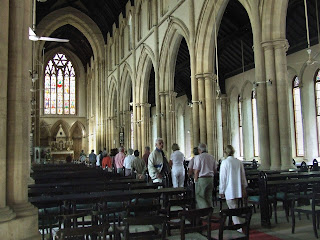As everybody
tells you ideas for novels can come from just about anywhere – news items,
magazine articles, films, music, other books, conversations overheard – and crucially
from families. A story from my own family gave me the inspiration for the novel
I’m currently writing.
My parents met
when my mother was sixteen and my father two years older. They both lived in
London, my mother in Acton and my father next door in Ealing. They met at a local
dance hall which was not unusual at the time. I suppose they must have known
each other four years or so before my father, who had joined the Royal
Artillery as a fifteen year old boy, was posted with his regiment to India. He
was stationed on the plains at Allahabad. The two of them wrote to each other -
I’m not sure how often - but over the next six years my dad gradually climbed
the army ranks to become a sergeant at the age of twenty-eight. At last he
could afford a wife and he asked my mum to come out to India and marry him.
To our 21st
century minds, that sounds simple. But my mother was a highly nervous woman and
had never travelled further from London than Southend or on anything more
exciting than a train. The fact that she found her way to Southampton, boarded
a troop ship there, and sailed the seas for three weeks to a country that could
only have been a word to her, still amazes me. And don’t forget she hadn’t seen
her new husband for six years! My father met her in Bombay/Mumbai and they were
married on the 18th April, 1937, at St John’s Afghan Church in the
leafy suburb of Colaba with two soldiers as witnesses. I have their marriage
certificate in my desk drawer.
These are
photographs of St John’s. The church fell into disrepair, I believe, after Indian
independence but has now been restored to its former glory. It gave me a thrill
to see how beautiful it was and to imagine my mum and dad walking down
that aisle together. It was a story I couldn’t resist.
My heroine,
Daisy Driscoll, is a working class girl – as my mother was. She embarks on the
same journey to Bombay and she marries a soldier in the same church in 1938. But
that’s when the similarities end. I can’t allow Daisy to enjoy the forty-seven years
of happy marriage that my mother did - that wouldn’t make a good mystery/crime
novel!



